Report on Law, Policy & Ethical Practice in HSC: Module Analysis
VerifiedAdded on 2023/01/19
|9
|2421
|79
Report
AI Summary
This report provides a comprehensive overview of the significance of law, policy, and ethical practices within the Health and Social Care (HSC) sector. It explores the roles of legislation, the executive, and the judiciary in setting legal and policy frameworks, emphasizing the importance of safety, competence, and ethical conduct for HSC practitioners. The report delves into various features of legislation, statutory guidance, codes of practice, and organizational policies. It examines how ethics informs HSC service practices and how national systems of government influence policy. Furthermore, the report highlights the impact of national and organizational policies, discussing relevant legislation like the Equality Act 2010 and the Mental Capacity Act 2005. It also explores how human rights laws influence fair treatment in the sector and details the implementation of legislation and policy to ensure safe and healthy conduct. The report analyzes recent HSC legislation and national policies, examining their importance in informing the responsibilities and rights of health practitioners. Finally, it discusses the impact of law and policy on HSC organizations and the ways in which HSC practitioners can ensure compliance with legislation and national policies through ethical practice.
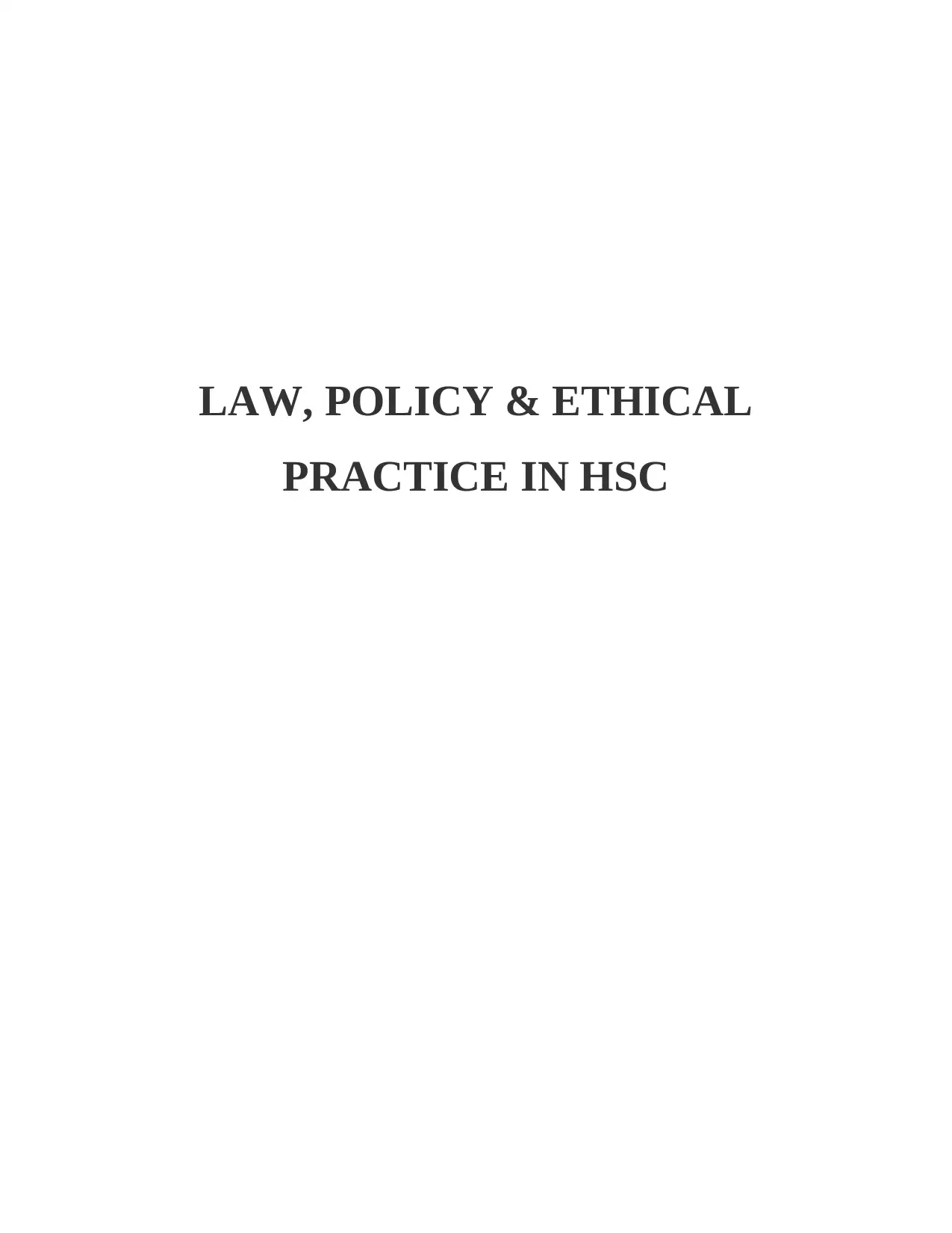
LAW, POLICY & ETHICAL
PRACTICE IN HSC
PRACTICE IN HSC
Paraphrase This Document
Need a fresh take? Get an instant paraphrase of this document with our AI Paraphraser
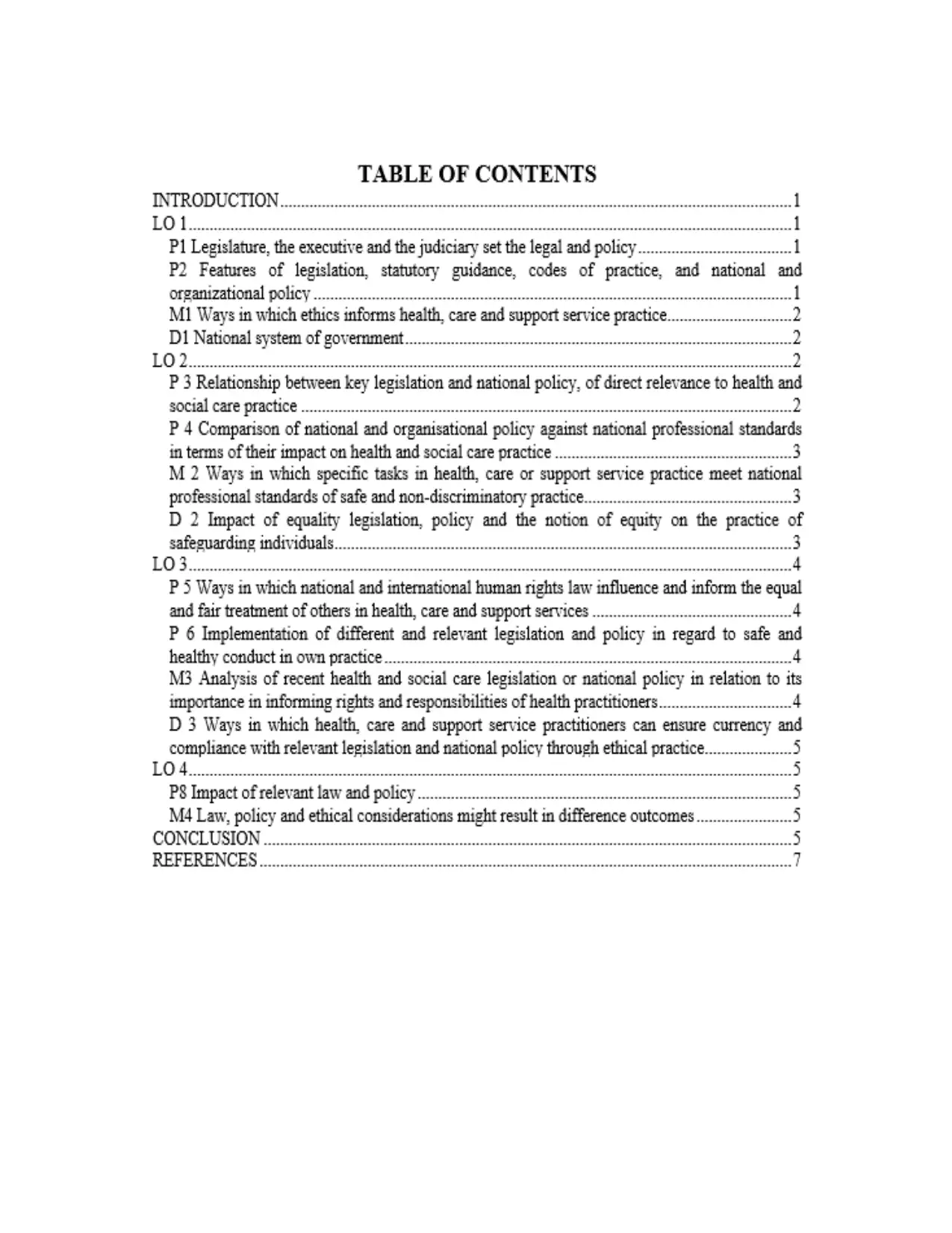
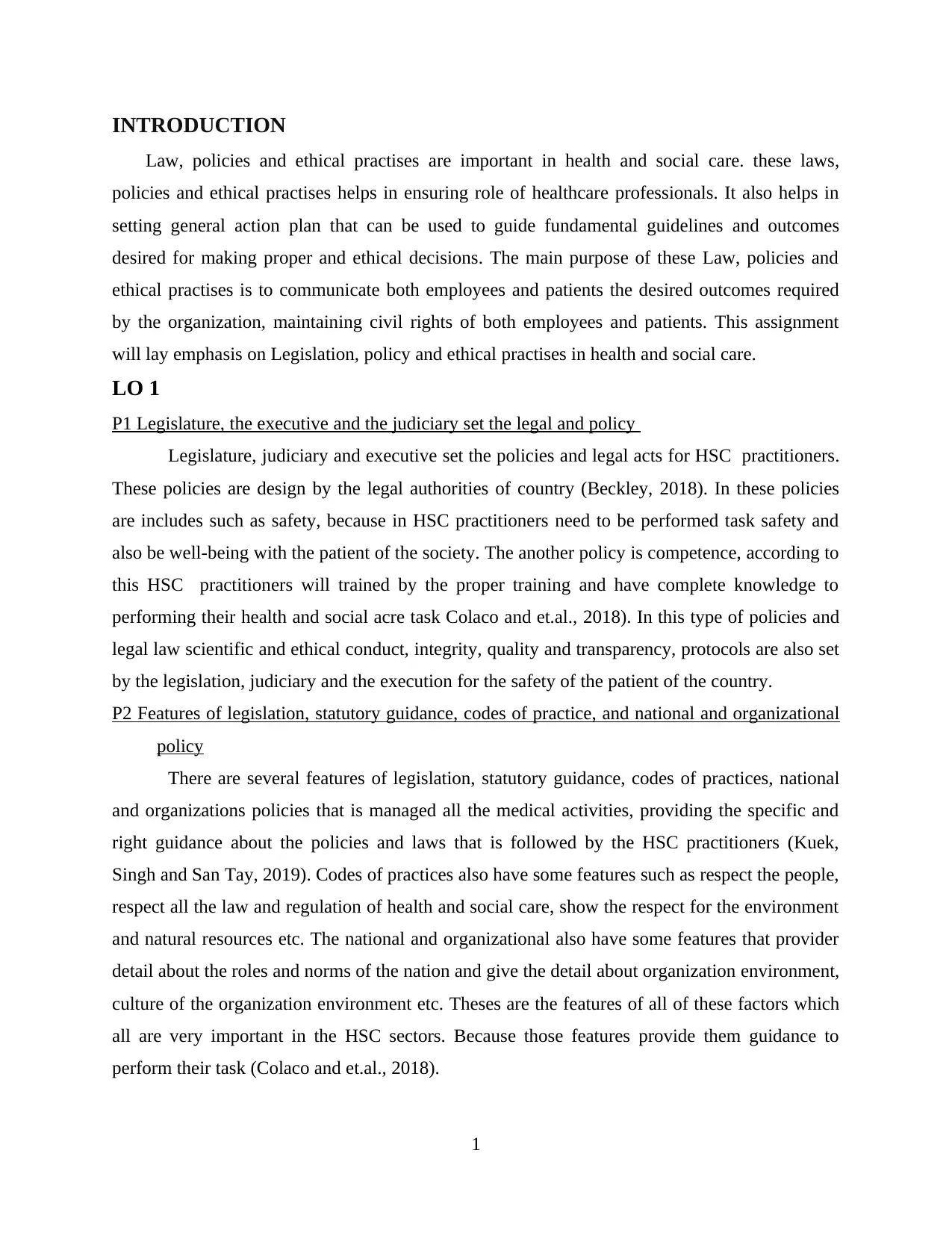
INTRODUCTION
Law, policies and ethical practises are important in health and social care. these laws,
policies and ethical practises helps in ensuring role of healthcare professionals. It also helps in
setting general action plan that can be used to guide fundamental guidelines and outcomes
desired for making proper and ethical decisions. The main purpose of these Law, policies and
ethical practises is to communicate both employees and patients the desired outcomes required
by the organization, maintaining civil rights of both employees and patients. This assignment
will lay emphasis on Legislation, policy and ethical practises in health and social care.
LO 1
P1 Legislature, the executive and the judiciary set the legal and policy
Legislature, judiciary and executive set the policies and legal acts for HSC practitioners.
These policies are design by the legal authorities of country (Beckley, 2018). In these policies
are includes such as safety, because in HSC practitioners need to be performed task safety and
also be well-being with the patient of the society. The another policy is competence, according to
this HSC practitioners will trained by the proper training and have complete knowledge to
performing their health and social acre task Colaco and et.al., 2018). In this type of policies and
legal law scientific and ethical conduct, integrity, quality and transparency, protocols are also set
by the legislation, judiciary and the execution for the safety of the patient of the country.
P2 Features of legislation, statutory guidance, codes of practice, and national and organizational
policy
There are several features of legislation, statutory guidance, codes of practices, national
and organizations policies that is managed all the medical activities, providing the specific and
right guidance about the policies and laws that is followed by the HSC practitioners (Kuek,
Singh and San Tay, 2019). Codes of practices also have some features such as respect the people,
respect all the law and regulation of health and social care, show the respect for the environment
and natural resources etc. The national and organizational also have some features that provider
detail about the roles and norms of the nation and give the detail about organization environment,
culture of the organization environment etc. Theses are the features of all of these factors which
all are very important in the HSC sectors. Because those features provide them guidance to
perform their task (Colaco and et.al., 2018).
1
Law, policies and ethical practises are important in health and social care. these laws,
policies and ethical practises helps in ensuring role of healthcare professionals. It also helps in
setting general action plan that can be used to guide fundamental guidelines and outcomes
desired for making proper and ethical decisions. The main purpose of these Law, policies and
ethical practises is to communicate both employees and patients the desired outcomes required
by the organization, maintaining civil rights of both employees and patients. This assignment
will lay emphasis on Legislation, policy and ethical practises in health and social care.
LO 1
P1 Legislature, the executive and the judiciary set the legal and policy
Legislature, judiciary and executive set the policies and legal acts for HSC practitioners.
These policies are design by the legal authorities of country (Beckley, 2018). In these policies
are includes such as safety, because in HSC practitioners need to be performed task safety and
also be well-being with the patient of the society. The another policy is competence, according to
this HSC practitioners will trained by the proper training and have complete knowledge to
performing their health and social acre task Colaco and et.al., 2018). In this type of policies and
legal law scientific and ethical conduct, integrity, quality and transparency, protocols are also set
by the legislation, judiciary and the execution for the safety of the patient of the country.
P2 Features of legislation, statutory guidance, codes of practice, and national and organizational
policy
There are several features of legislation, statutory guidance, codes of practices, national
and organizations policies that is managed all the medical activities, providing the specific and
right guidance about the policies and laws that is followed by the HSC practitioners (Kuek,
Singh and San Tay, 2019). Codes of practices also have some features such as respect the people,
respect all the law and regulation of health and social care, show the respect for the environment
and natural resources etc. The national and organizational also have some features that provider
detail about the roles and norms of the nation and give the detail about organization environment,
culture of the organization environment etc. Theses are the features of all of these factors which
all are very important in the HSC sectors. Because those features provide them guidance to
perform their task (Colaco and et.al., 2018).
1
⊘ This is a preview!⊘
Do you want full access?
Subscribe today to unlock all pages.

Trusted by 1+ million students worldwide
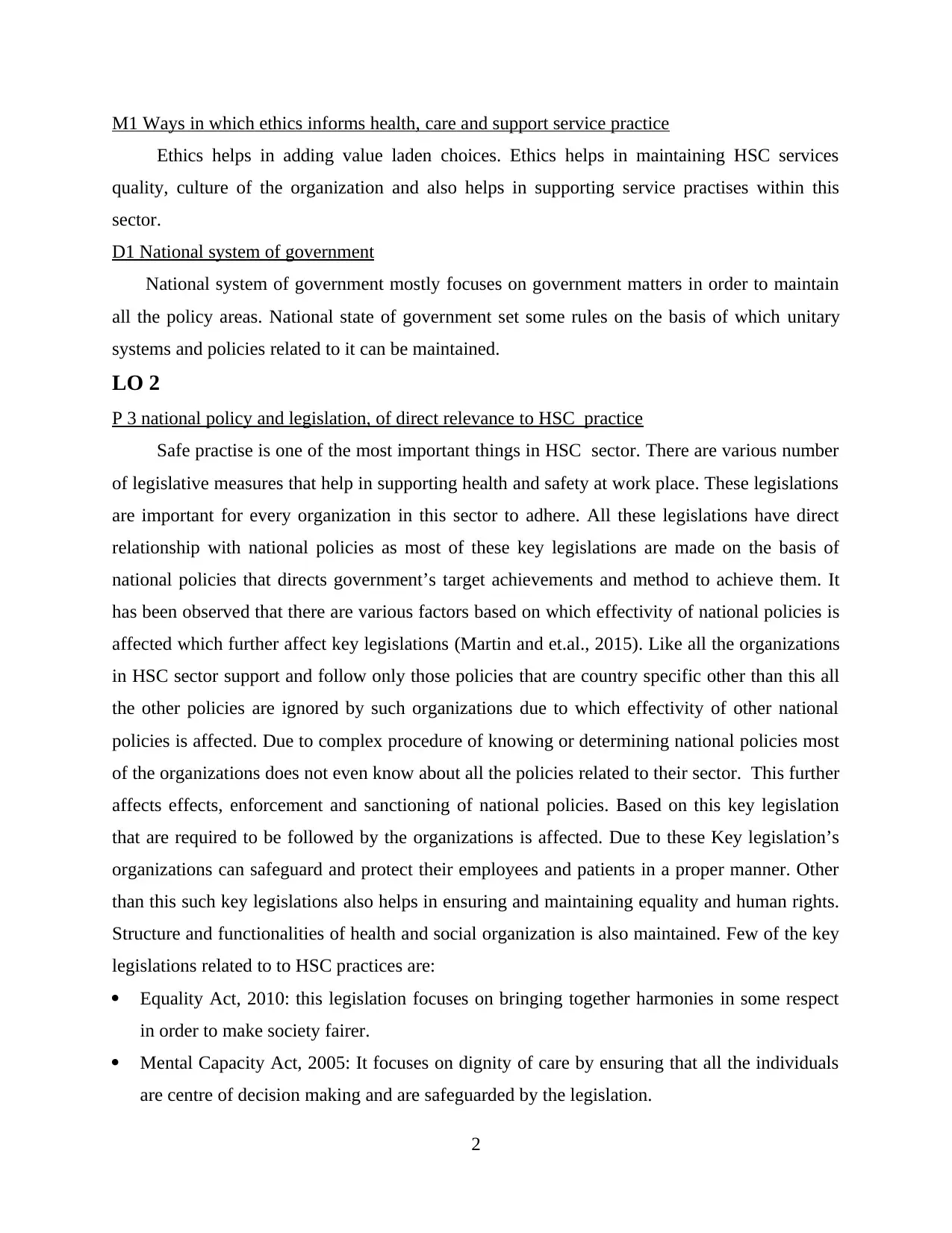
M1 Ways in which ethics informs health, care and support service practice
Ethics helps in adding value laden choices. Ethics helps in maintaining HSC services
quality, culture of the organization and also helps in supporting service practises within this
sector.
D1 National system of government
National system of government mostly focuses on government matters in order to maintain
all the policy areas. National state of government set some rules on the basis of which unitary
systems and policies related to it can be maintained.
LO 2
P 3 national policy and legislation, of direct relevance to HSC practice
Safe practise is one of the most important things in HSC sector. There are various number
of legislative measures that help in supporting health and safety at work place. These legislations
are important for every organization in this sector to adhere. All these legislations have direct
relationship with national policies as most of these key legislations are made on the basis of
national policies that directs government’s target achievements and method to achieve them. It
has been observed that there are various factors based on which effectivity of national policies is
affected which further affect key legislations (Martin and et.al., 2015). Like all the organizations
in HSC sector support and follow only those policies that are country specific other than this all
the other policies are ignored by such organizations due to which effectivity of other national
policies is affected. Due to complex procedure of knowing or determining national policies most
of the organizations does not even know about all the policies related to their sector. This further
affects effects, enforcement and sanctioning of national policies. Based on this key legislation
that are required to be followed by the organizations is affected. Due to these Key legislation’s
organizations can safeguard and protect their employees and patients in a proper manner. Other
than this such key legislations also helps in ensuring and maintaining equality and human rights.
Structure and functionalities of health and social organization is also maintained. Few of the key
legislations related to to HSC practices are:
Equality Act, 2010: this legislation focuses on bringing together harmonies in some respect
in order to make society fairer.
Mental Capacity Act, 2005: It focuses on dignity of care by ensuring that all the individuals
are centre of decision making and are safeguarded by the legislation.
2
Ethics helps in adding value laden choices. Ethics helps in maintaining HSC services
quality, culture of the organization and also helps in supporting service practises within this
sector.
D1 National system of government
National system of government mostly focuses on government matters in order to maintain
all the policy areas. National state of government set some rules on the basis of which unitary
systems and policies related to it can be maintained.
LO 2
P 3 national policy and legislation, of direct relevance to HSC practice
Safe practise is one of the most important things in HSC sector. There are various number
of legislative measures that help in supporting health and safety at work place. These legislations
are important for every organization in this sector to adhere. All these legislations have direct
relationship with national policies as most of these key legislations are made on the basis of
national policies that directs government’s target achievements and method to achieve them. It
has been observed that there are various factors based on which effectivity of national policies is
affected which further affect key legislations (Martin and et.al., 2015). Like all the organizations
in HSC sector support and follow only those policies that are country specific other than this all
the other policies are ignored by such organizations due to which effectivity of other national
policies is affected. Due to complex procedure of knowing or determining national policies most
of the organizations does not even know about all the policies related to their sector. This further
affects effects, enforcement and sanctioning of national policies. Based on this key legislation
that are required to be followed by the organizations is affected. Due to these Key legislation’s
organizations can safeguard and protect their employees and patients in a proper manner. Other
than this such key legislations also helps in ensuring and maintaining equality and human rights.
Structure and functionalities of health and social organization is also maintained. Few of the key
legislations related to to HSC practices are:
Equality Act, 2010: this legislation focuses on bringing together harmonies in some respect
in order to make society fairer.
Mental Capacity Act, 2005: It focuses on dignity of care by ensuring that all the individuals
are centre of decision making and are safeguarded by the legislation.
2
Paraphrase This Document
Need a fresh take? Get an instant paraphrase of this document with our AI Paraphraser
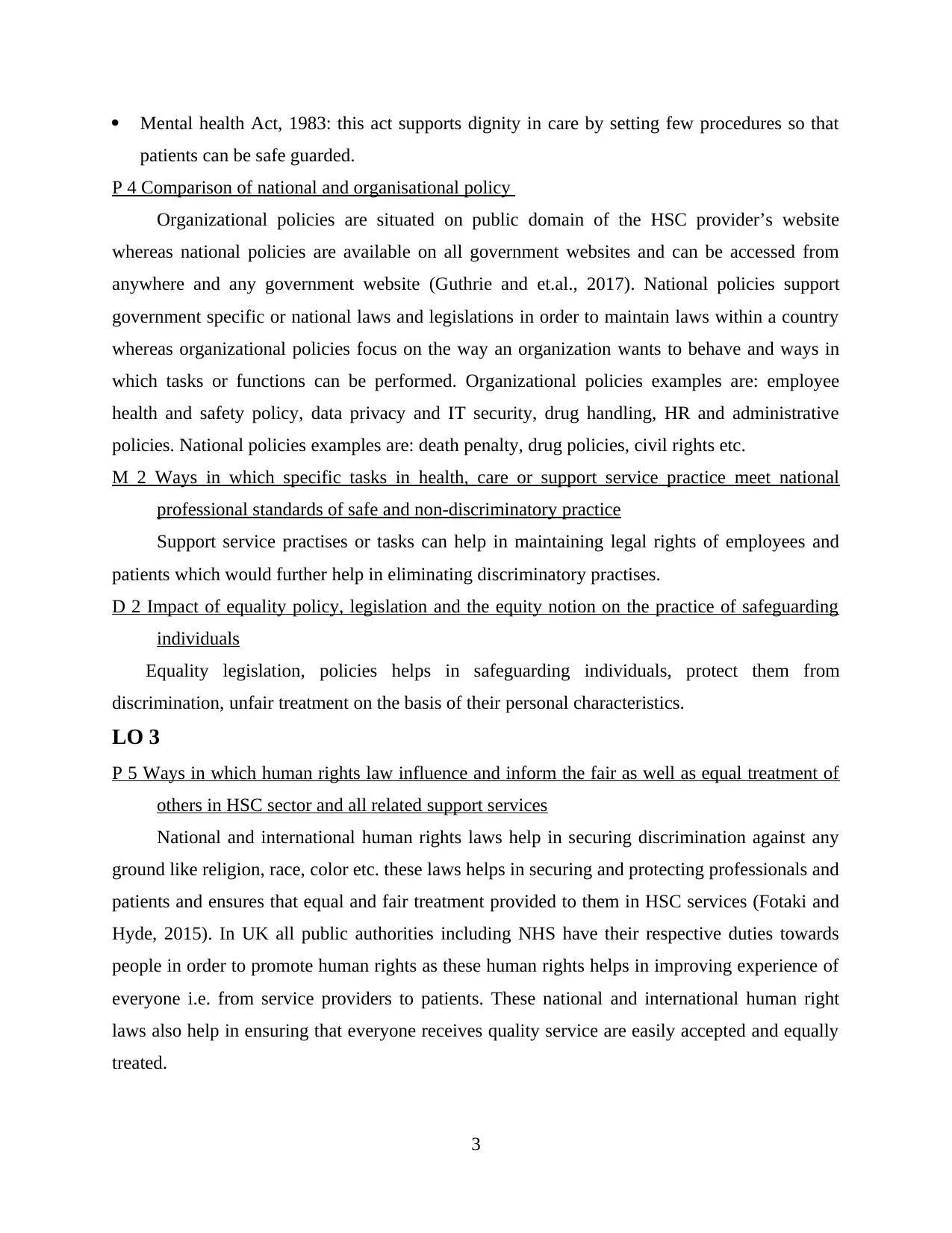
Mental health Act, 1983: this act supports dignity in care by setting few procedures so that
patients can be safe guarded.
P 4 Comparison of national and organisational policy
Organizational policies are situated on public domain of the HSC provider’s website
whereas national policies are available on all government websites and can be accessed from
anywhere and any government website (Guthrie and et.al., 2017). National policies support
government specific or national laws and legislations in order to maintain laws within a country
whereas organizational policies focus on the way an organization wants to behave and ways in
which tasks or functions can be performed. Organizational policies examples are: employee
health and safety policy, data privacy and IT security, drug handling, HR and administrative
policies. National policies examples are: death penalty, drug policies, civil rights etc.
M 2 Ways in which specific tasks in health, care or support service practice meet national
professional standards of safe and non-discriminatory practice
Support service practises or tasks can help in maintaining legal rights of employees and
patients which would further help in eliminating discriminatory practises.
D 2 Impact of equality policy, legislation and the equity notion on the practice of safeguarding
individuals
Equality legislation, policies helps in safeguarding individuals, protect them from
discrimination, unfair treatment on the basis of their personal characteristics.
LO 3
P 5 Ways in which human rights law influence and inform the fair as well as equal treatment of
others in HSC sector and all related support services
National and international human rights laws help in securing discrimination against any
ground like religion, race, color etc. these laws helps in securing and protecting professionals and
patients and ensures that equal and fair treatment provided to them in HSC services (Fotaki and
Hyde, 2015). In UK all public authorities including NHS have their respective duties towards
people in order to promote human rights as these human rights helps in improving experience of
everyone i.e. from service providers to patients. These national and international human right
laws also help in ensuring that everyone receives quality service are easily accepted and equally
treated.
3
patients can be safe guarded.
P 4 Comparison of national and organisational policy
Organizational policies are situated on public domain of the HSC provider’s website
whereas national policies are available on all government websites and can be accessed from
anywhere and any government website (Guthrie and et.al., 2017). National policies support
government specific or national laws and legislations in order to maintain laws within a country
whereas organizational policies focus on the way an organization wants to behave and ways in
which tasks or functions can be performed. Organizational policies examples are: employee
health and safety policy, data privacy and IT security, drug handling, HR and administrative
policies. National policies examples are: death penalty, drug policies, civil rights etc.
M 2 Ways in which specific tasks in health, care or support service practice meet national
professional standards of safe and non-discriminatory practice
Support service practises or tasks can help in maintaining legal rights of employees and
patients which would further help in eliminating discriminatory practises.
D 2 Impact of equality policy, legislation and the equity notion on the practice of safeguarding
individuals
Equality legislation, policies helps in safeguarding individuals, protect them from
discrimination, unfair treatment on the basis of their personal characteristics.
LO 3
P 5 Ways in which human rights law influence and inform the fair as well as equal treatment of
others in HSC sector and all related support services
National and international human rights laws help in securing discrimination against any
ground like religion, race, color etc. these laws helps in securing and protecting professionals and
patients and ensures that equal and fair treatment provided to them in HSC services (Fotaki and
Hyde, 2015). In UK all public authorities including NHS have their respective duties towards
people in order to promote human rights as these human rights helps in improving experience of
everyone i.e. from service providers to patients. These national and international human right
laws also help in ensuring that everyone receives quality service are easily accepted and equally
treated.
3
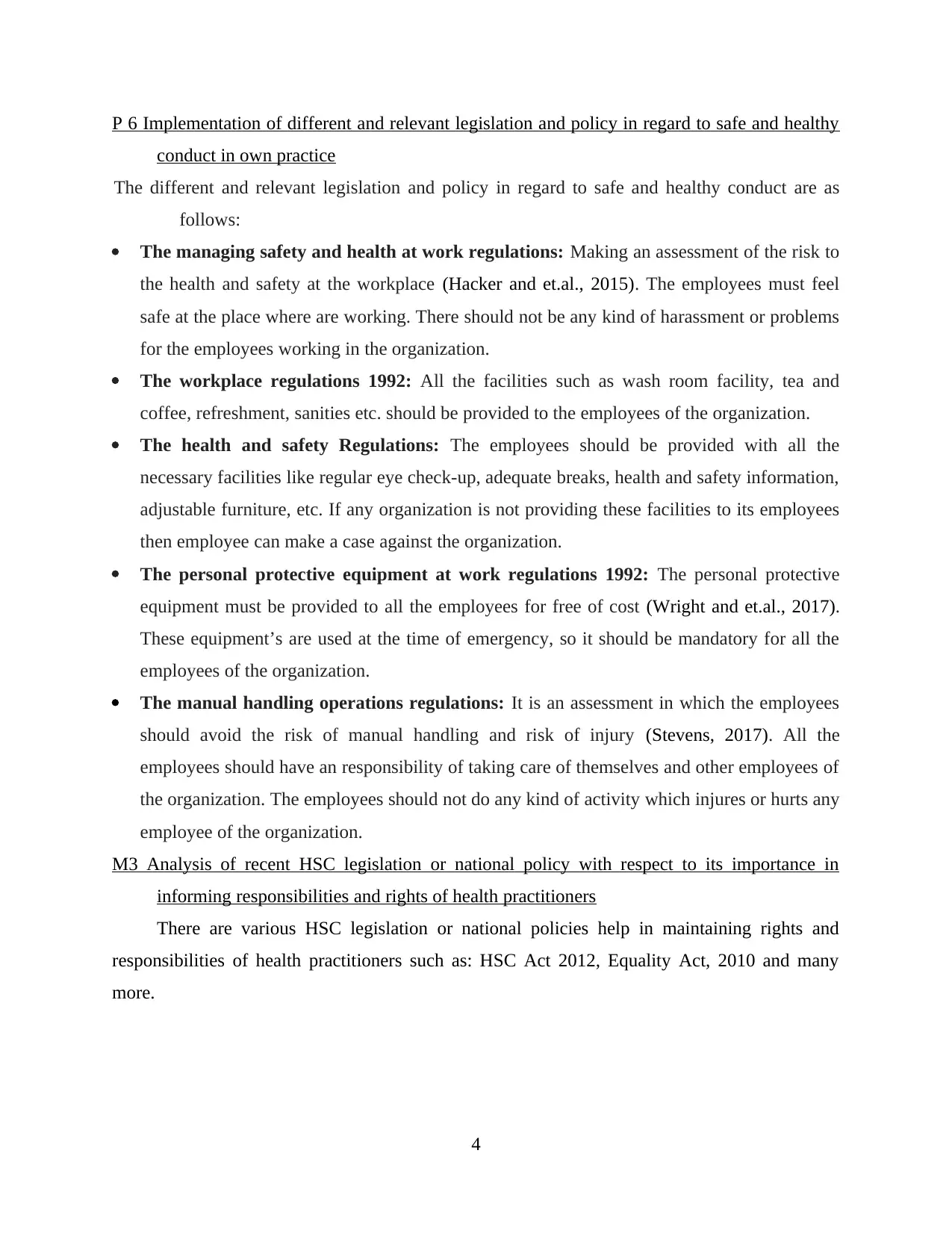
P 6 Implementation of different and relevant legislation and policy in regard to safe and healthy
conduct in own practice
The different and relevant legislation and policy in regard to safe and healthy conduct are as
follows:
The managing safety and health at work regulations: Making an assessment of the risk to
the health and safety at the workplace (Hacker and et.al., 2015). The employees must feel
safe at the place where are working. There should not be any kind of harassment or problems
for the employees working in the organization.
The workplace regulations 1992: All the facilities such as wash room facility, tea and
coffee, refreshment, sanities etc. should be provided to the employees of the organization.
The health and safety Regulations: The employees should be provided with all the
necessary facilities like regular eye check-up, adequate breaks, health and safety information,
adjustable furniture, etc. If any organization is not providing these facilities to its employees
then employee can make a case against the organization.
The personal protective equipment at work regulations 1992: The personal protective
equipment must be provided to all the employees for free of cost (Wright and et.al., 2017).
These equipment’s are used at the time of emergency, so it should be mandatory for all the
employees of the organization.
The manual handling operations regulations: It is an assessment in which the employees
should avoid the risk of manual handling and risk of injury (Stevens, 2017). All the
employees should have an responsibility of taking care of themselves and other employees of
the organization. The employees should not do any kind of activity which injures or hurts any
employee of the organization.
M3 Analysis of recent HSC legislation or national policy with respect to its importance in
informing responsibilities and rights of health practitioners
There are various HSC legislation or national policies help in maintaining rights and
responsibilities of health practitioners such as: HSC Act 2012, Equality Act, 2010 and many
more.
4
conduct in own practice
The different and relevant legislation and policy in regard to safe and healthy conduct are as
follows:
The managing safety and health at work regulations: Making an assessment of the risk to
the health and safety at the workplace (Hacker and et.al., 2015). The employees must feel
safe at the place where are working. There should not be any kind of harassment or problems
for the employees working in the organization.
The workplace regulations 1992: All the facilities such as wash room facility, tea and
coffee, refreshment, sanities etc. should be provided to the employees of the organization.
The health and safety Regulations: The employees should be provided with all the
necessary facilities like regular eye check-up, adequate breaks, health and safety information,
adjustable furniture, etc. If any organization is not providing these facilities to its employees
then employee can make a case against the organization.
The personal protective equipment at work regulations 1992: The personal protective
equipment must be provided to all the employees for free of cost (Wright and et.al., 2017).
These equipment’s are used at the time of emergency, so it should be mandatory for all the
employees of the organization.
The manual handling operations regulations: It is an assessment in which the employees
should avoid the risk of manual handling and risk of injury (Stevens, 2017). All the
employees should have an responsibility of taking care of themselves and other employees of
the organization. The employees should not do any kind of activity which injures or hurts any
employee of the organization.
M3 Analysis of recent HSC legislation or national policy with respect to its importance in
informing responsibilities and rights of health practitioners
There are various HSC legislation or national policies help in maintaining rights and
responsibilities of health practitioners such as: HSC Act 2012, Equality Act, 2010 and many
more.
4
⊘ This is a preview!⊘
Do you want full access?
Subscribe today to unlock all pages.

Trusted by 1+ million students worldwide
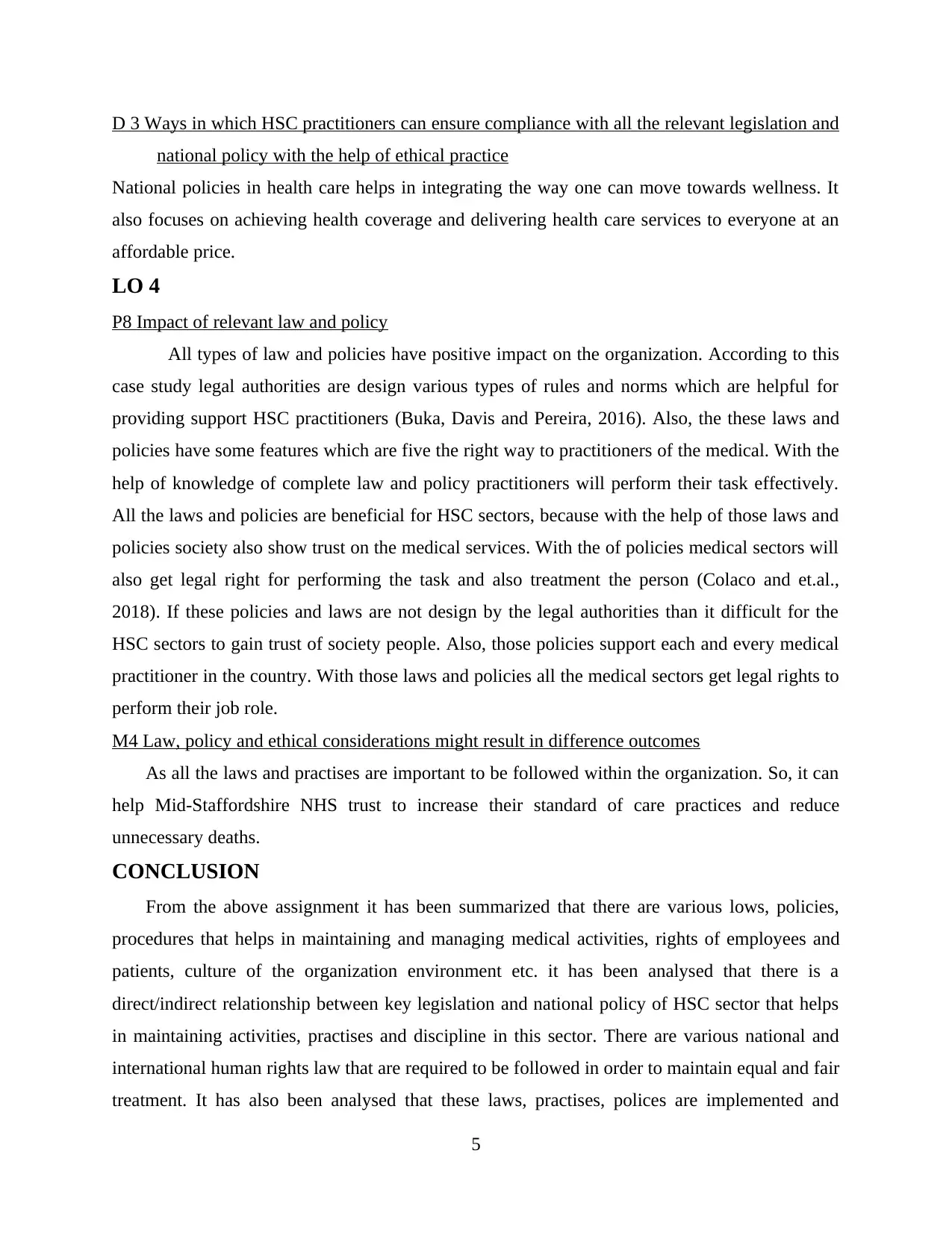
D 3 Ways in which HSC practitioners can ensure compliance with all the relevant legislation and
national policy with the help of ethical practice
National policies in health care helps in integrating the way one can move towards wellness. It
also focuses on achieving health coverage and delivering health care services to everyone at an
affordable price.
LO 4
P8 Impact of relevant law and policy
All types of law and policies have positive impact on the organization. According to this
case study legal authorities are design various types of rules and norms which are helpful for
providing support HSC practitioners (Buka, Davis and Pereira, 2016). Also, the these laws and
policies have some features which are five the right way to practitioners of the medical. With the
help of knowledge of complete law and policy practitioners will perform their task effectively.
All the laws and policies are beneficial for HSC sectors, because with the help of those laws and
policies society also show trust on the medical services. With the of policies medical sectors will
also get legal right for performing the task and also treatment the person (Colaco and et.al.,
2018). If these policies and laws are not design by the legal authorities than it difficult for the
HSC sectors to gain trust of society people. Also, those policies support each and every medical
practitioner in the country. With those laws and policies all the medical sectors get legal rights to
perform their job role.
M4 Law, policy and ethical considerations might result in difference outcomes
As all the laws and practises are important to be followed within the organization. So, it can
help Mid-Staffordshire NHS trust to increase their standard of care practices and reduce
unnecessary deaths.
CONCLUSION
From the above assignment it has been summarized that there are various lows, policies,
procedures that helps in maintaining and managing medical activities, rights of employees and
patients, culture of the organization environment etc. it has been analysed that there is a
direct/indirect relationship between key legislation and national policy of HSC sector that helps
in maintaining activities, practises and discipline in this sector. There are various national and
international human rights law that are required to be followed in order to maintain equal and fair
treatment. It has also been analysed that these laws, practises, polices are implemented and
5
national policy with the help of ethical practice
National policies in health care helps in integrating the way one can move towards wellness. It
also focuses on achieving health coverage and delivering health care services to everyone at an
affordable price.
LO 4
P8 Impact of relevant law and policy
All types of law and policies have positive impact on the organization. According to this
case study legal authorities are design various types of rules and norms which are helpful for
providing support HSC practitioners (Buka, Davis and Pereira, 2016). Also, the these laws and
policies have some features which are five the right way to practitioners of the medical. With the
help of knowledge of complete law and policy practitioners will perform their task effectively.
All the laws and policies are beneficial for HSC sectors, because with the help of those laws and
policies society also show trust on the medical services. With the of policies medical sectors will
also get legal right for performing the task and also treatment the person (Colaco and et.al.,
2018). If these policies and laws are not design by the legal authorities than it difficult for the
HSC sectors to gain trust of society people. Also, those policies support each and every medical
practitioner in the country. With those laws and policies all the medical sectors get legal rights to
perform their job role.
M4 Law, policy and ethical considerations might result in difference outcomes
As all the laws and practises are important to be followed within the organization. So, it can
help Mid-Staffordshire NHS trust to increase their standard of care practices and reduce
unnecessary deaths.
CONCLUSION
From the above assignment it has been summarized that there are various lows, policies,
procedures that helps in maintaining and managing medical activities, rights of employees and
patients, culture of the organization environment etc. it has been analysed that there is a
direct/indirect relationship between key legislation and national policy of HSC sector that helps
in maintaining activities, practises and discipline in this sector. There are various national and
international human rights law that are required to be followed in order to maintain equal and fair
treatment. It has also been analysed that these laws, practises, polices are implemented and
5
Paraphrase This Document
Need a fresh take? Get an instant paraphrase of this document with our AI Paraphraser
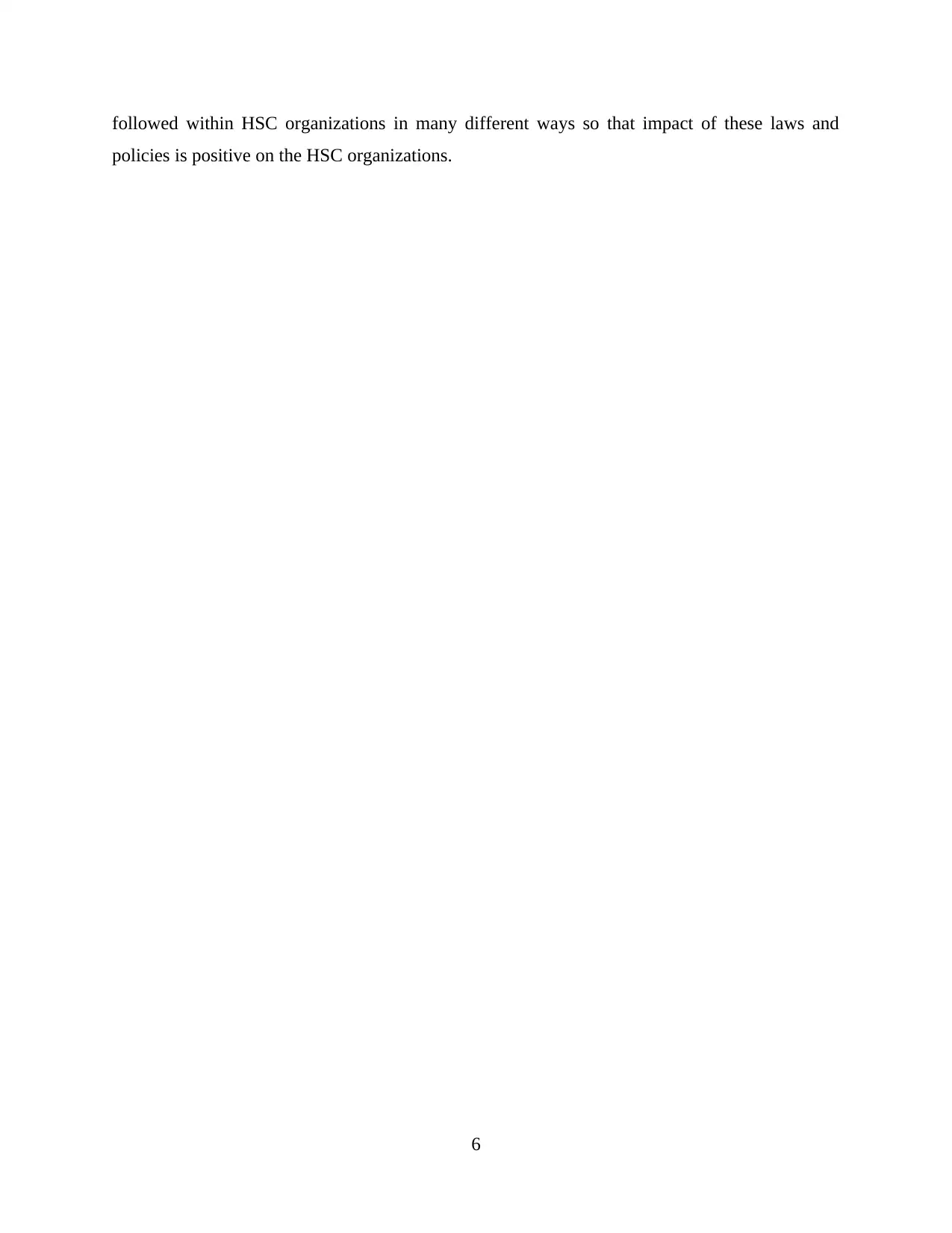
followed within HSC organizations in many different ways so that impact of these laws and
policies is positive on the HSC organizations.
6
policies is positive on the HSC organizations.
6
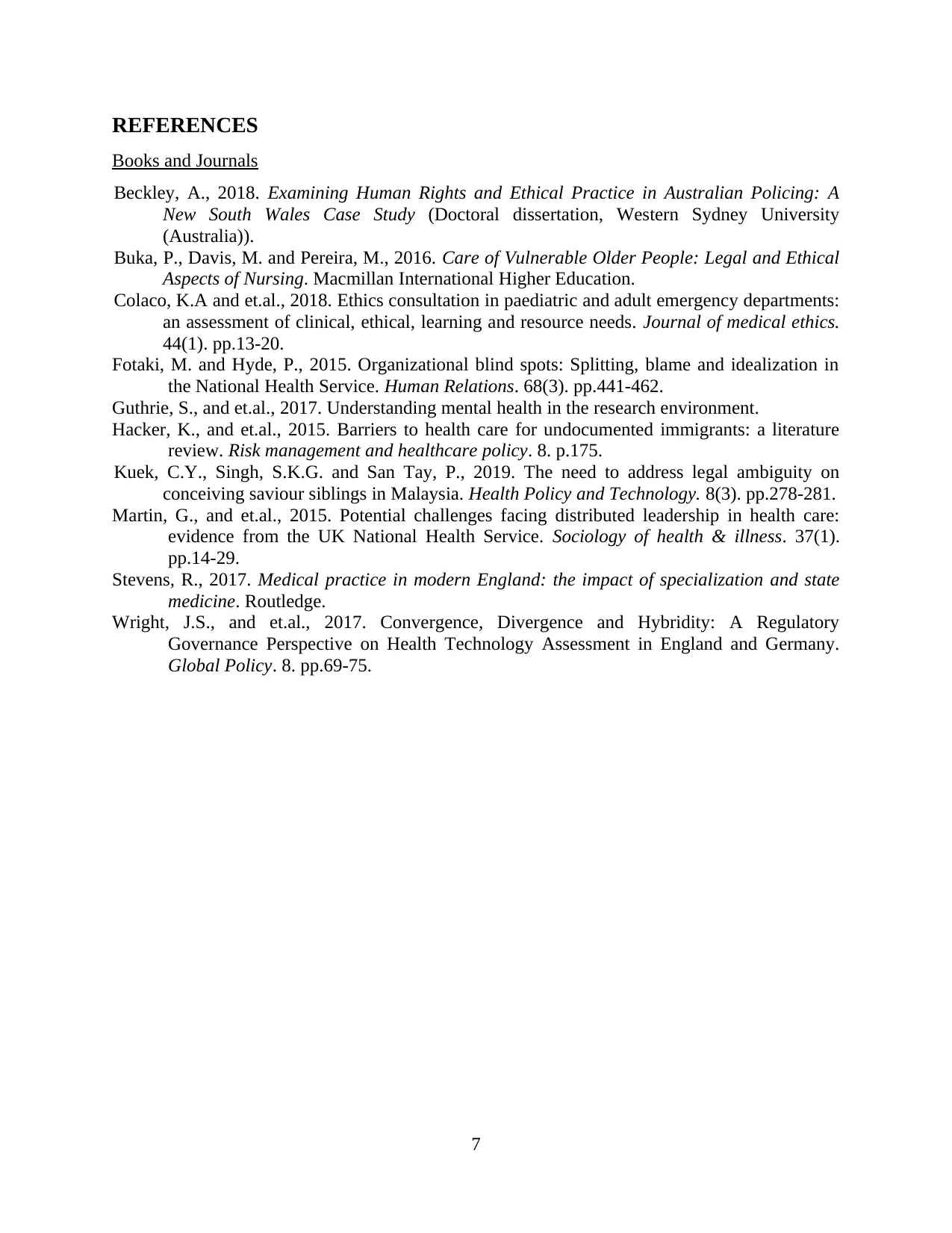
REFERENCES
Books and Journals
Beckley, A., 2018. Examining Human Rights and Ethical Practice in Australian Policing: A
New South Wales Case Study (Doctoral dissertation, Western Sydney University
(Australia)).
Buka, P., Davis, M. and Pereira, M., 2016. Care of Vulnerable Older People: Legal and Ethical
Aspects of Nursing. Macmillan International Higher Education.
Colaco, K.A and et.al., 2018. Ethics consultation in paediatric and adult emergency departments:
an assessment of clinical, ethical, learning and resource needs. Journal of medical ethics.
44(1). pp.13-20.
Fotaki, M. and Hyde, P., 2015. Organizational blind spots: Splitting, blame and idealization in
the National Health Service. Human Relations. 68(3). pp.441-462.
Guthrie, S., and et.al., 2017. Understanding mental health in the research environment.
Hacker, K., and et.al., 2015. Barriers to health care for undocumented immigrants: a literature
review. Risk management and healthcare policy. 8. p.175.
Kuek, C.Y., Singh, S.K.G. and San Tay, P., 2019. The need to address legal ambiguity on
conceiving saviour siblings in Malaysia. Health Policy and Technology. 8(3). pp.278-281.
Martin, G., and et.al., 2015. Potential challenges facing distributed leadership in health care:
evidence from the UK National Health Service. Sociology of health & illness. 37(1).
pp.14-29.
Stevens, R., 2017. Medical practice in modern England: the impact of specialization and state
medicine. Routledge.
Wright, J.S., and et.al., 2017. Convergence, Divergence and Hybridity: A Regulatory
Governance Perspective on Health Technology Assessment in England and Germany.
Global Policy. 8. pp.69-75.
7
Books and Journals
Beckley, A., 2018. Examining Human Rights and Ethical Practice in Australian Policing: A
New South Wales Case Study (Doctoral dissertation, Western Sydney University
(Australia)).
Buka, P., Davis, M. and Pereira, M., 2016. Care of Vulnerable Older People: Legal and Ethical
Aspects of Nursing. Macmillan International Higher Education.
Colaco, K.A and et.al., 2018. Ethics consultation in paediatric and adult emergency departments:
an assessment of clinical, ethical, learning and resource needs. Journal of medical ethics.
44(1). pp.13-20.
Fotaki, M. and Hyde, P., 2015. Organizational blind spots: Splitting, blame and idealization in
the National Health Service. Human Relations. 68(3). pp.441-462.
Guthrie, S., and et.al., 2017. Understanding mental health in the research environment.
Hacker, K., and et.al., 2015. Barriers to health care for undocumented immigrants: a literature
review. Risk management and healthcare policy. 8. p.175.
Kuek, C.Y., Singh, S.K.G. and San Tay, P., 2019. The need to address legal ambiguity on
conceiving saviour siblings in Malaysia. Health Policy and Technology. 8(3). pp.278-281.
Martin, G., and et.al., 2015. Potential challenges facing distributed leadership in health care:
evidence from the UK National Health Service. Sociology of health & illness. 37(1).
pp.14-29.
Stevens, R., 2017. Medical practice in modern England: the impact of specialization and state
medicine. Routledge.
Wright, J.S., and et.al., 2017. Convergence, Divergence and Hybridity: A Regulatory
Governance Perspective on Health Technology Assessment in England and Germany.
Global Policy. 8. pp.69-75.
7
⊘ This is a preview!⊘
Do you want full access?
Subscribe today to unlock all pages.

Trusted by 1+ million students worldwide
1 out of 9
Related Documents
Your All-in-One AI-Powered Toolkit for Academic Success.
+13062052269
info@desklib.com
Available 24*7 on WhatsApp / Email
![[object Object]](/_next/static/media/star-bottom.7253800d.svg)
Unlock your academic potential
Copyright © 2020–2026 A2Z Services. All Rights Reserved. Developed and managed by ZUCOL.





